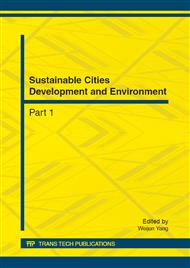p.879
p.887
p.891
p.898
p.902
p.907
p.916
p.921
p.925
Inter-City Public Transportation Pricing Based on Game Theory Analysis
Abstract:
Rail transit system and buses are the two main modes of public passenger transportation between adjacent cities in China. The development of public transport system and especially that of the rail transit may promote the sustainable development of the region. According to principle of utility maximization, this paper predicts passengers’ traffic mode choices based on evaluation model of passenger’s general traffic expenses. This paper analyzes the game relation of pricing between Rail Company and Bus Company on the condition of free competition from the perspective of maximizations of profit. It presents the model of public transportation pricing strategy and the model of subsidy policy in two situations respectively, which are when government subsides public transportation and when government does not. This paper provides basis for related administrative departments to make policies on sustainable transport pricing.
Info:
Periodical:
Pages:
902-906
Citation:
Online since:
October 2012
Authors:
Keywords:
Price:
Сopyright:
© 2012 Trans Tech Publications Ltd. All Rights Reserved
Share:
Citation:


